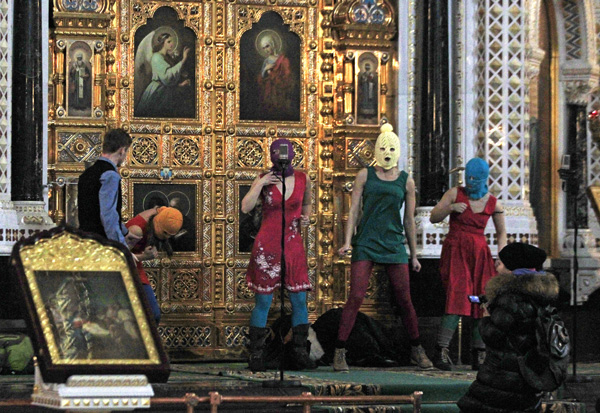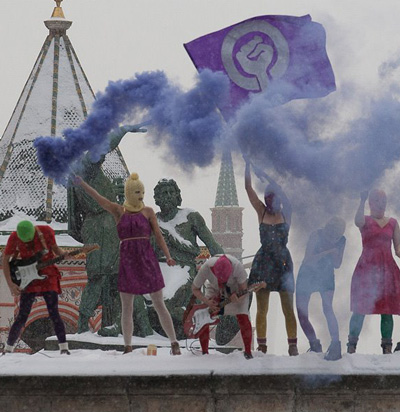Pussy Riot’s Revolt Against a Revolting Culture
By a Revolution writing team | February 3, 2014 | Revolution Newspaper | revcom.us
In November 2011, a group of masked women appeared atop a scaffold in a Moscow subway. While tearing apart down feather pillows and showering the feathers onto the train platform below, they performed “Osvobodi Bruschatku” (“Release the Cobblestones”).
This was the first public performance by Pussy Riot—at the time a crew of about 11 women performers. A blog posting accompanying the performance stated: “Your ballots will be used as toilet paper by the Presidential Administration.”
The provocative performance caused a buzz online—especially in Russia. But the world was soon to hear a lot more about Pussy Riot.
A Performance That Rocked the World
On February 21, 2012, several women—members of Pussy Riot—staged a performance on the soleas of Moscow’s Cathedral of Christ the Savior, Russia’s most prominent Christian Orthodox place of worship. The soleas is an elevated extension of the sanctuary platform and a particularly “holy” space in church doctrine—among other things, women are prohibited from being on it in any circumstances.

Pussy Riot in the Cathedral of Christ the Savior. Photo: AP
Dressed in balaclavas (ski masks), and irreverently brightly colored outfits, with exuberant choreography that included boxing moves, they lip synched to a recording of their composition “Punk Prayer—Mother of God, Chase Putin Away!”
It was a cultural explosion of joyous, defiant rebellion. For a tumultuous 40 seconds, church officials chased down and dragged off the performers, while other church functionaries tried to block the video recording of the event. But too late! This protest against the ruling regime of Vladimir Putin, the church’s support for that regime, and on another level, this defiant rebellion against the oppression of women, would be heard, and resonate, around the world.
That evening, Pussy Riot released the performance as a music video titled “Punk Prayer—Mother of God, Chase Putin Away!”
Members of Pussy Riot were making a specific political statement in their performance at the Cathedral of Christ the Savior. But as a work of creative art, the performance deserves appreciation that transcends the specific message and demands.
A Trial That Polarized Russia
On an altar to obscurantism, repression, prejudice, and ignorance toward women and gay people, Pussy Riot staged an audacious manifesto of cultural rebellion that anyone who would love to see a world beyond superstition, prejudice, and oppression has got to find heartening.
On the other hand... some forces in the world who don’t appreciate that kind of rebellion did not feel that way. The performance would become an event that would polarize Russian society and the world—especially after three members of Pussy Riot were arrested in March 2012 and put on trial by Russian authorities. They were charged for their performance with “hooliganism motivated by religious hatred.”
Nadezhda (Nadya) Tolokonnikova, Maria Alyokhina, and Yekaterina Samutsevich were put on trial in Moscow on July 30, 2012. The three faced possible sentences of up to seven years imprisonment. Prosecutors said that among their crimes, the group’s song “Putin Zassal” included the lyrics “The Orthodox Religion is a hardened penis / Coercing its subjects to accept conformity.”
The three defendants insisted that they had not, in fact, broken Russian laws—specifically that their performance was not motivated by “hate.” At the same time, they were utterly unrepentant about the performance. Nadya Tolokonnikova told the Russian court the song they performed is “about the fusion of Moscow patriarchy and the government. ‘Holy shit’ is our evaluation of the situation in the country. This opinion is not blasphemy.”

Pussy Riot on Red Square in Moscow in January, 2012.
Photo: Denis Bochkarev/Wikimedia Commons
As the trial progressed, protests for and against Pussy Riot took place in Russia. Intolerant, backward sections of Russian society reacted with frenzied fury. The trial was broadcast live, and as people saw the defendants confined to cages in the courtroom, persecuted for their artistic statement, and making articulate and passionate arguments in the face of the regime’s repression, more and more people were moved to stand with them, from different perspectives. (An HBO film on Pussy Riot and the trial, Pussy Riot: A Punk Prayer, documents how different people, including people in the families of the performers, went through changes and came to support Pussy Riot over the course of the trial.)
All three were convicted by the judge on August 17, 2012, who ruled they had “crudely undermined the social order” with their protest, showing a “complete lack of respect” for believers.
Putin, while stating he thought Pussy Riot should not be judged “too severely,” insisted that it was right to bring Pussy Riot to trial because “the country has very grave memories of the initial period of Soviet rule, when a huge number of priests suffered. Many churches were destroyed and all our traditional faiths suffered huge damage.” The three were sentenced to two years in prison. They appealed their convictions. Yekaterina Samutsevich succeeded on appeal in having her two-year jail term reduced to a suspended sentence.
A huge movement developed, in and out of Russia, demanding the release of the locked up members of Pussy Riot. The most profound factor behind that is what it reveals about the depth and sweep of fury over the status of women in today’s world, the state of that world overall, and a refusal to accept this.
Released from Jail and Unrepentant
After nearly two years in prison, and global protest, Putin released from prison the two jailed members of Pussy Riot. Nadya Tolokonnikova walked out of prison in the eastern city of Krasnoyarsk in brutally cold Siberian weather and flashed a victory sign to reporters waiting outside, shouting “Russia without Putin!”
On her release, Maria Alyokhina told Russian television that had she been given the chance, she would have turned down the offer of amnesty and served out the remainder of her sentence, which was due to finish in March, and that members of Pussy Riot would “be creating very special, colorful, and powerful programs to defend other innocent women in Russian prisons who are being turned into slaves right now.”
And Nadya Tolokonnikova announced that the two women planned a new project: “Russia is built along the same lines as a prison camp at the moment, so it’s important to change the prison camps so that we can start to change Russia,” she said. “Everything is just starting, so fasten your seat belts.”
A Welcome Revolt Against a Revolting Culture
Pussy Riot’s performance at Moscow’s Cathedral of Christ the Savior emerged in a world where, from the burka to the degrading commodification of women in “the West,” the oppression (and liberation) of women is a seismic faultline in every society on this planet.
It is refreshing in itself—in a world where culture is far too dominated by pathetic self-absorption, “get rich or die trying,” disrespecting and degrading women, and other forms of channeling of the oppressor’s mentality and morality—that Pussy Riot overtly acknowledges a connection between politics and art and consciously deploys their performance art to oppose oppression of women especially, with art that is daring (artistically and physically), creative, and oppositional.
Members of Pussy Riot have a radical and feminist philosophy, and to their credit, they openly acknowledge it, articulate it, and discuss it. Along with insights into and determined opposition to the imposition of stifling conformity, and the oppression of women and LGBT people and others, the politics expressed in their interviews tend to reflect an identification of the root of the problem in Russian society today in the “Soviet model” and the antidote to that being more “democracy.”
In their identification of the source of repression in Russia in the “Soviet model,” members of Pussy Riot conflate two radically different kinds of societies. There is a tremendous amount of confusion about this in the world, and in Russia especially. “Communism” is generally associated—wrongly—with an era when the Soviet Union called itself “socialist” but was in fact a capitalist-imperialist society, starting in 1956 until the official, formal breakup of the Soviet Union. The actual experience of socialism in Soviet Union, from 1917-1956, and the even more radical liberatory experience of China from 1949-1976 has been subjected to decades of massive lies and distortion. (For the real story of the experience of previous socialist revolutions, see “You Don’t Know What You Think You ‘Know’ About... The Communist Revolution and the REAL Path to Emancipation: Its History and Our Future.”)
The antidote to capitalism is not more democracy in the abstract. Countries like Russia, and the United States, are capitalist-imperialist societies and the logic of capitalism-imperialism requires exploitation and violent oppression. Democratic forms, like voting for “choices” that channel discontent and rebellion into dead ends, are of a piece with, and complementary to that violent oppression.
In the realm of culture, for example, regardless of the form of capitalist rule, genuinely rebellious artistic expression is met with repression, censorship, and even jail. In the U.S., the crudest misogyny is pumped out over the airwaves while radical voices in rock, hip-hop and other popular genres are marginalized or shut down. And in every society, huge sections of people are locked out of participating in culture of any kind, particularly radical emancipatory culture—something that members of Pussy Riot have expressed a determination to break down.
That is the way the world is. But that is not the only way the world has been, and even more to the point, not the way it could be. The Constitution for the New Socialist Republic in North America (Draft Proposal) provides a vision and program for a society that not only tolerates dissent in the realms of politics and culture, but promotes that, as part of a vibrant and liberating society moving to expose and uproot all oppression.
Anyone who wants to see a world like that, and anyone who wants to see a radical alternative to the oppression of women, and the whole oppressive world order, has got to appreciate the defiant impact of Pussy Riot who, in their own way, are contributing to a revolt against a revolting culture that is suffocating humanity.
The world can use a whole lot more of that!
If you like this article, subscribe, donate to and sustain Revolution newspaper.
